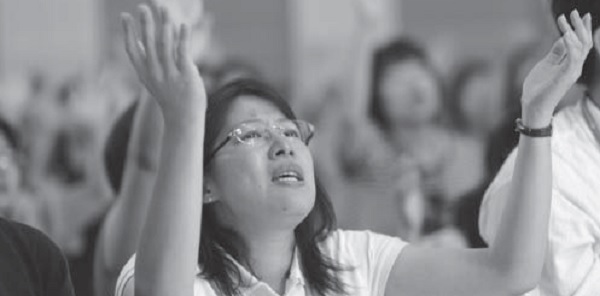Jihad?
Challenges in the relationship between pastors and elders

▲Pastor Lin Xiongjian (left) of Zhongli Truth Church believes that: God has given the church a glorious status, and it should call on the church to love each other, thereby affecting the community and society.
Pastors and elders should form a team that serves God and people, and they are all people whose spiritual character is respected. However, due to their differences in personality, cultural background, spiritual maturity, leadership model, etc., they have different views on the direction of ministry development, different definitions of responsibilities, and even different expectations for both parties.
Because of these differences, the relationship between pastors and elders faces great challenges.
The biblical principle is actually very clear. Isn’t the head of the church other than Christ? Didn’t the Lord Jesus give the command that believers love one another? Didn’t Paul also teach this in 1 Timothy 5:17 that “those who work hard in preaching and teaching” should be more respected?
Just because the church belongs to Christ, pastors and deacons should act according to the teachings of the Bible, so that every different "seeing" and "impression" can be based on theological views, and every different "vision" and "mission" can also be based on theological views. Back it up with scripture quotes. When pastors and deacons each believe that they are on God's side, or that God is on their own side, their differences of opinion often turn into judgments of right and wrong, and the conflict is resolved into "acting on behalf of heaven," and finally deteriorates into a confrontation between gods and demons, a full-scale "holy war." .
Difference: Enemy or friend?
(Case 1) When a ministry review meeting was held at the beginning of the year, the pastor suggested adding more children’s Sunday school classes, strengthening teacher training, and holding a summer Bible school. He believes that developing children's ministry can effectively attract local Chinese to the church and should be started immediately.
The deacons saw it differently. They feel that children's ministry is important, but they should first ask the congregation for their willingness to participate in teacher training, study which set of teaching materials is suitable, and then decide whether to increase the budget next year.
The pastor said, "God's work cannot wait."
The deacon replied, "A thorough plan is the key to success."
Many churches may have experienced similar cases: Pastors and deacons obviously have different opinions on the procedures and progress of ministry implementation, even though the starting point is to develop the gospel field and expand the kingdom of God.
When differences arise, collisions and frictions will inevitably occur, and the attitude towards differences can affect the actions we take when facing the party with whom we disagree.
If differences are treated with a positive attitude, each other can make up for their weaknesses, accept each other, and build each other up, it can become an opportunity for both parties to make progress. If viewed with a negative attitude, differences will become the basis for prejudice and a means to form cliques. If they continue to be used as tools for power struggles, without distinguishing between right and wrong, it will eventually lead to the breakdown of relationships, the division of the church, and the development of the Kingdom of God will suffer.
The turning point lies in whether these dissenters are enemies or friends.
If pastors and deacons can see each other as co-workers and seek spiritual unity as their principle, they will first pray and wait to see if the other party is similarly moved, and respect each other in attitude; the deacons will be sincerely convinced of the pastor’s spiritual leadership, and the pastor will be sincerely convinced. Consider the deacon’s sincere advice carefully. Once you decide on a direction, you will devote yourself to it and no longer insist on your opinion. Even if the result is unsatisfactory, you will not be sarcastic and say, "Look, I told you before..."
On the contrary, if the pastor sees the deacon as a check and balance, and the deacon sees the pastor as a hired servant, and they are wary of each other, any incident can become a trigger for conflict. The pastor insists on shouldering the heavy responsibility of preaching and praying. Any decision is inspired by God. To oppose him is to resist God. Deacons emphasize the concept of equality for all in a democratic society and are the spokespersons of the members. Pastors must listen to opinions and cannot be arbitrary.
In the relationship between pastors and elders, how to define their respective roles and how to form a team of co-workers and serve as spiritual partners have become delicate and sensitive issues.
Pastor Yang Ningya has served as the overseer of the Lutheran Church in Taiwan for many years and is currently the senior pastor of Taipei Truth Church. He believes that the relationship between pastors and elders is similar to the relationship between husband and wife. The husband loves his wife as much as he loves himself, and the wife should also respect her husband. Pastor Yang takes unity as the highest principle of leading the church, emphasizes communication, and builds the fellowship of brothers and sisters with love.
The Lutheran church adopts a supervisory system, and the church is led by the pastor. Members and deacons respect the pastor. But this does not mean that pastors can do whatever they want.
Lin Xiongjian, senior pastor of Taiwan's Zhongli Truth Church, proposed using the early church as the basis for dividing the positions and powers of pastors and deacons. The pastoral team composed of pastors and elders must "concentrate on prayer and preaching"; the deacons chosen to perform ministry and manage affairs should also be spiritually mature, "people who are filled with the Holy Spirit and sufficient wisdom" ( See Acts 6:1-4).
Pastor Lin hopes that deacons will play the role of supporters and offer suggestions in a gentle manner before leaders make any decisions. Pastors inherit the spiritual authority given by God and become the spiritual leaders of the church. They should also listen humbly to the opinions of their colleagues. Because although they have the final decision-making power, they also need to bear the final responsibility.
Culture: Harvest field, battlefield?
(Case 2) Mingcheng Grace Church was originally established after the campus fellowship of a nearby university grew. Many deacons and co-workers believed in the Lord on campus and grew up. International students are still the main gospel field of the church.
After attending several student gatherings, Pastor Li, who had just been hired by the church, took the initiative to express his willingness to lead Bible studies to Deacon Xu, who was in charge of student ministry. He also suggested that brothers and sisters open their homes to receive students during holidays.
Deacon Xu replied to Pastor Li: "I graduated from this school. Students can see how the Lord has blessed my studies and work. It is more convincing for me to lead them."
Pastor Qiu Maosong, who has served as the general secretary of the Los Angeles Chinese Church Workers’ Association since 1991, has intervened to mediate many conflicts between pastors and elders. He has also observed a major challenge in their relationships—who’s words count in the church? ?

▲Pastor Yang Ningya encouraged pastors to stick to their teaching positions and be the spiritual parents of the entire congregation.
The influx of Chinese overseas students and new immigrants into North America has indeed become a vast field for the gospel, but it has also brought about the dual impact of Chinese and Western culture as well as temporal and spiritual culture. Like Deacon Li in the case, many of the elders and co-workers of Chinese churches in North America have either served for many years or have successful careers, and have accumulated experience and status both spiritually and temporally.
Pastor Qiu Maosong analyzed that the traditional Chinese concept of respecting the elderly and the virtuous has made pastors always enjoy the respect of people inside and outside the church. For Chinese believers in North America, Western culture’s emphasis on the equality of all people confuses the Bible’s teaching of submission to authority. Once the pastor who founded the church retires, the elders will despise the education and qualifications of the new pastor and may not respect the old pastor as much as they do. In addition, they have heard of a management evaluation system in the corporate world and want to implement it in the church. They often evaluate pastors with a critical eye. Pastors who "do not perform well" cannot be re-appointed.
Culture can affect the attitude of interpersonal relationships, but the relationship between pastors and elders also needs to be considered at a spiritual level.
God values everyone equally, but also gives people different missions and roles. Pastor Qiu suggested that pastors and deacons should respect each other and be honest with each other. After all, pastoring is not a profession, but a profession that responds to God’s call and devotes oneself to it. Perseverance needs to accept the spiritual leadership of the pastor.

▲Pastors can be trained to learn to handle conflicts and promote the ministry of peacemakers in the church.
Pastors should also trust the elders and understand that after working hard during the week, they spend all their weekends dealing with church affairs. The time and effort that Changzhi devotes to the work of the Kingdom of God are entirely out of love for God and love for people.
Making good use of church evaluation can actually help you manage the church more effectively. This tool has an "encouraging effect rather than "finding faults." It can reduce subjective criticism and increase objective understanding..." ("Church Administration", Su Wenlong, Huashen Publishing House, 2004 revised edition)
If pastors and deacons fail to consider culture and add many "thinkings" and "assumptions" to their interactions, misunderstandings will ferment in the relationship and lead to conflicts over time.
Pastor Shi Jinglu has been missionary in Caribbean island countries for many years and is currently the Asia Department Director of Hope International Ministries. She observed that the backgrounds of believers are diverse. Taking the Chinese church she pastors as an example, the members include immigrants from China, Hong Kong, and Taiwan, as well as overseas Chinese from all over the world, as well as American husbands of Chinese wives, and second-generation parents who grew up in the United States. generation of immigrants.
Pastor Shi encourages pastors to receive training in cross-cultural pastoral care so that they can have a deeper understanding and more sensitive consideration for believers from different backgrounds. Because culture not only affects believers’ attitude toward authority, but also affects their attitude toward conflict and the way they resolve it. The more you know, the more you understand, and the more you can put yourself in the other person's shoes.
Kindness: The Key to Recovery
It is extremely challenging for pastors and elders to get along with each other, and conflicts are inevitable. How often do reconciliation get in the way because of "the plank in each other's eye"? The person involved was full of righteous indignation and wanted to show justice. His anger distorted his position and turned from judging the incident to a personal attack.
Jesus’ teachings in Matthew 17:15-17 are steps for dealing with interpersonal conflicts. Even if the other party refuses to change after all, the righteous God will not acquit the guilty. Many pastors interviewed said that pastors and elders must also recognize God’s sovereignty when facing challenges in relationships.
Pastor Shi Jinglu of Hope International Ministries emphasizes that treating each other with kindness and conveying the truth with a gentle attitude can not only effectively resolve the tension in the relationship, but also have the opportunity to restore the erring party.
She recalled that when she was a missionary in the Cayman Islands, she presided over the construction of a missionary school. Thousands of dollars were once given to a deacon to purchase building materials, only to have him misappropriate the money.
Pastor Shi learned of this and was eager to make his crimes public. But the more he wanted to accuse, the heavier his heart felt, because once exposed, this brother would not only be banned from the church, but would also no longer be able to gain a foothold on the island.
She got on her bicycle and circled the town several times, praying constantly. In the end, Pastor Shi only informed a few relevant deacons of the church to accept the brother's repayment of the money he owed in installments. The erring brother was given the opportunity to turn around, resulting in a great change in his spiritual life. Pastor Shi recalled the experience many years ago and was still deeply grateful for God’s mercy.
Reconciliation: necessary and vital
Conflict resolution is not easy, but reconciliation is necessary and vital.
Pastor Qiu Maosong of the Los Angeles Federation of Workers often encourages pastors and elders to connect through prayer for each other. Colleagues in the church are no different from colleagues in the workplace. In addition to working together, they also have a friendship as brothers and sisters in the Lord. They are partners walking together on the road to heaven. The care for each other should go beyond ministry effectiveness and should be a sincere care for the whole person.
Pastor Yang Ningya of Taipei Truth Church believes that the relationship between the co-workers needs to be maintained for a long time, and they should have a large deposit in the "love account" with trust and watchfulness. Once unpleasantness arises, we must immediately reconcile, confess to each other, and forgive each other.
He reminded pastors and elders that Satan can use the world's values and human sinfulness to worsen the depth and breadth of conflicts, causing the congregation's faith to be affected and the church to embark on a path of division. What a disservice this would be to the Kingdom of God!
Pastor Yang earnestly exhorted pastors to stick to their teaching positions and be the spiritual parents of the entire congregation. Because many conflicts are exacerbated by deviations in understanding the truth. When pastors or elders fail in their duties, it is not because they lack competent ability or knowledge, but because they neglect to do the lessons of loving and obeying one another among God’s children.
He hopes that the team of co-workers will fully devote themselves to the church’s outreach, because they will always preach the gospel, always review the true meaning of salvation, and recall their own experiences of being forgiven and healed by God. Only when you are reconciled to God can you know how to be reconciled to others. Aren’t we like the servant in Jesus’ parable in Matthew 19 who owed millions but was forgiven? How great is the mercy we have received, how much more should we have mercy on our brothers?

▲The harm caused by conflict requires the church to pray together for God’s forgiveness and healing.
Reconstruction: turning crisis into opportunity
Pastor Lin Xiongjian of Zhongli Truth Church proposed another perspective on facing conflicts. Disagreements, differences of opinion, and even disputes over doctrinal interpretations are just the tip of the iceberg. Using the emergence of conflicts to explore deep issues in the soul is an opportunity for character to be tempered and life to grow.
Many years ago, when he decided to respond to God's call to preach full-time and prepare to enter the seminary, it was at a time when the conflict in the church was at its peak. Members were at loggerheads at the conference, with pastors, deacons, and members attacking each other. Pastor Lin saw his parents-in-law sitting at the table, expressing his embarrassment and worry in silence.
On the way home, my father-in-law spoke. "The church is in such chaos, why do you still want to be a preacher?"
Pastor Lin was deeply moved, "Yes, just because the church is in such a mess, I should come out to preach."
His past experiences are etched in his heart, and he understands firsthand the importance of church unity. After participating in the Pastoral Seminar held by the Peace Messenger Association in Taipei in 2009, Pastor Lin worked hard to promote the Peace Messenger ministry in the church. More than 200 co-workers have received training. He has always held the belief that the church has been given a glorious status by God and should use mutual love as its flagship to influence the community and society. Under the leadership of Pastor Lin, Zhongli Truth Church is actively working towards this goal.
The harm caused by conflict requires God’s forgiveness and healing. The church can gather the congregation through solemn meetings (the ancient Jews continued to celebrate the day after the Feast of Tabernacles, and the people would gather in front of the tabernacle; today it refers to Christians’ gatherings to repent, reflect, and pray for important matters.) to gather the congregation and pray to God with one heart (Reference "Handling and Reconstruction of Church Conflicts", You Hongxiang and Qiu Qingping, 2002). The apostle John’s earnest teaching conveys the promise that we will be forgiven and cleansed (see 1 John 1:9).
The relationship between pastors and elders does face many challenges and even leads to fierce conflicts. However, when raising the sword of the Holy Spirit, which direction should the blade face? As Paul stated in Ephesians 6:11-17, the whole armor of God is given to resist the wiles of the devil. This is the enemy of "Holy War"!
(Photos for this article are provided by Zhongli Truth Church and Taipei Truth Church.)
7 Principles for Conflict Management in Philemon
1. Humility.
2. Be honest.
3. Open your heart.
4. Submit.
5. Be optimistic.
6. Respect God’s sovereignty.
7. Be careful with what you say.
(Information provided by: Pastor Shi Jinglu)
7 Exercises for Confession
1. Admit your fault to everyone you have offended.
2. Avoid words like “if,” “but,” and “maybe.”
3. Concretely admit your mistake.
4. Acknowledge the harm done.
5. Accept the consequences.
6. Change your behavior.
7. Ask for forgiveness.
(Information provided by: American Peacemaker Ministries)
 Author profile
Author profile
Lin Minwen loves classical music and literature, and is dedicated to the ministry of literature.
